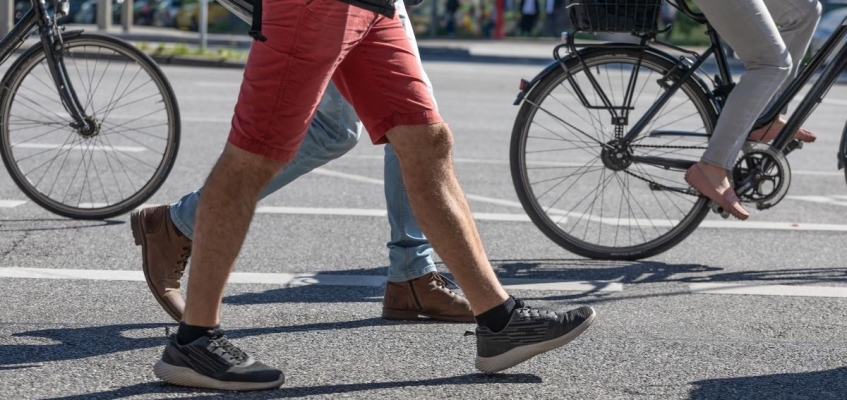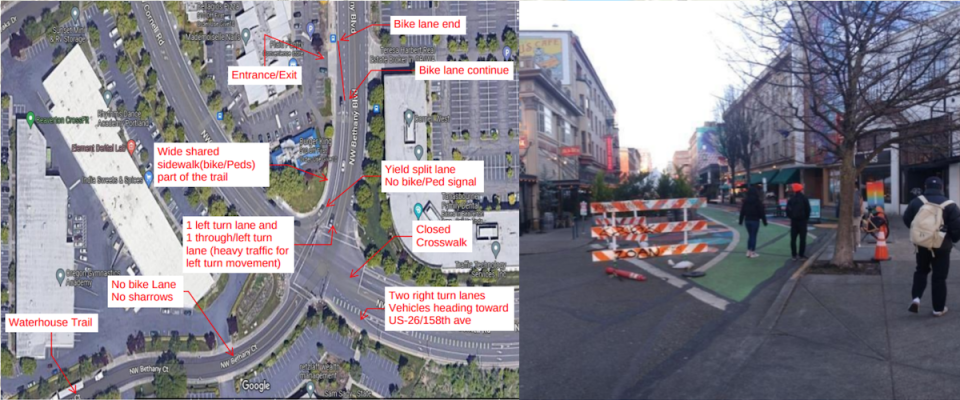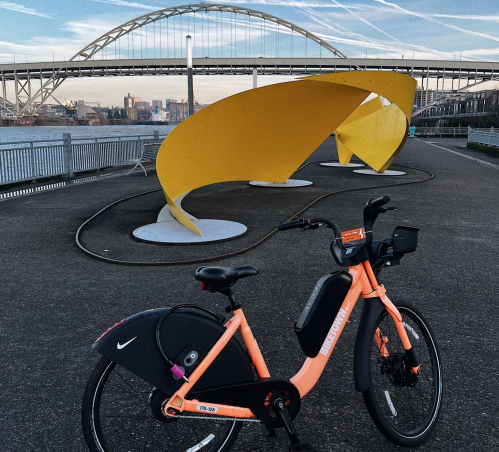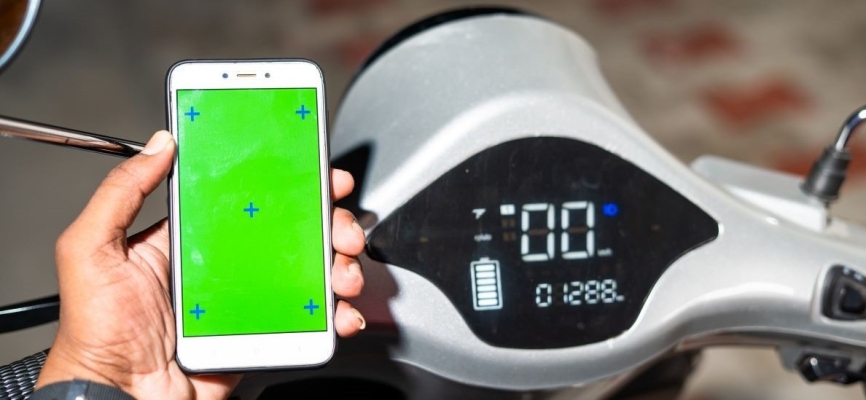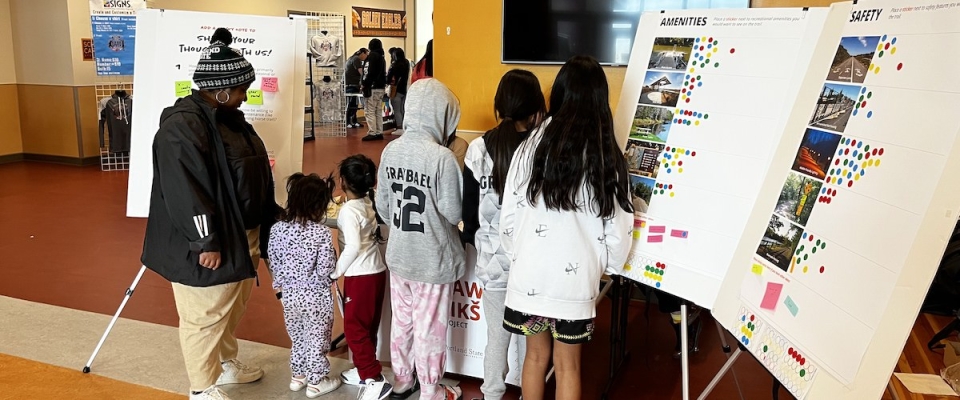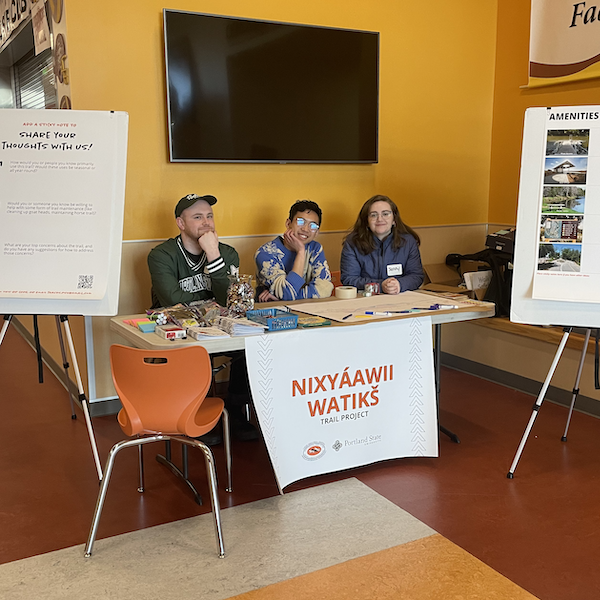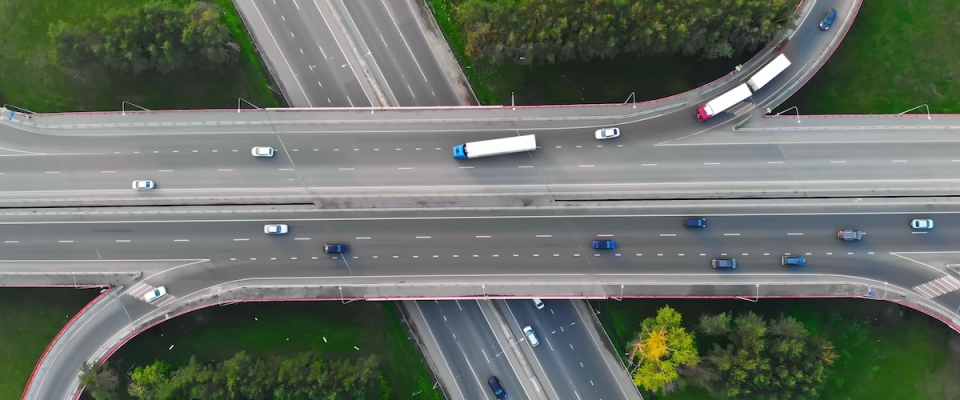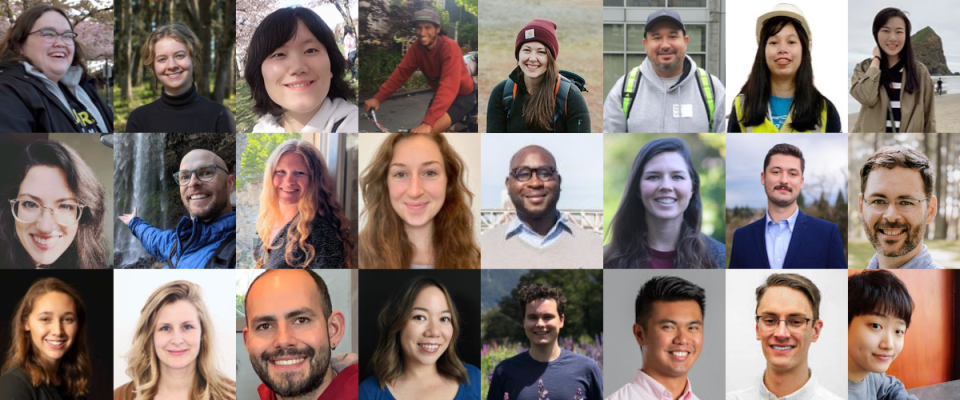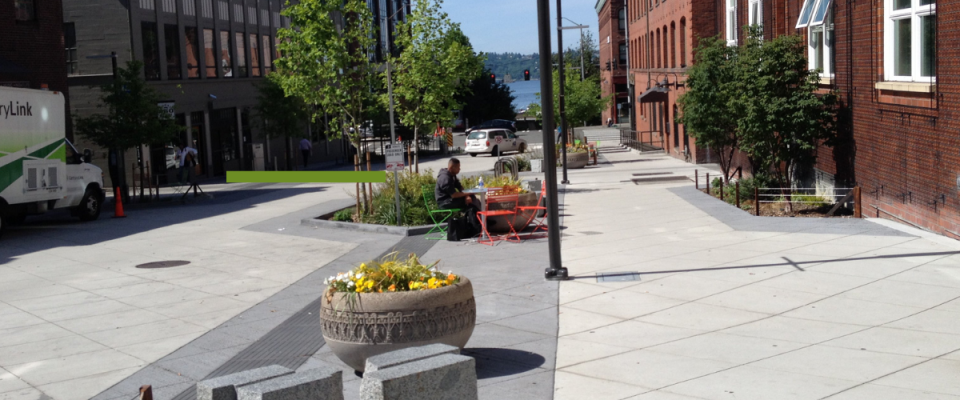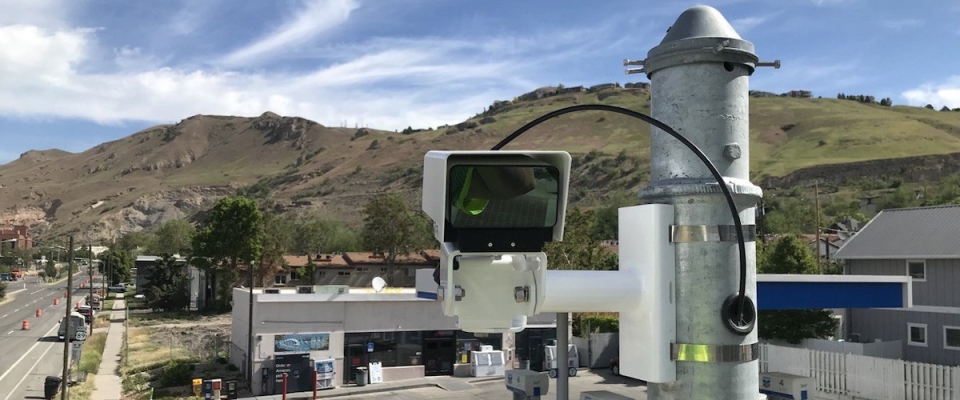Since 2016, the Transportation Research and Education Center (TREC) at Portland State University has hosted a free transportation summer camp for high school students. Isa Swain, an incoming sophomore in civil engineering at Portland State University, exemplifies why TREC engages in K-12 education: students' interest in transportation doesn't have to wait until the university. After attending the summer camp in 2020, Swain came to PSU to study civil engineering last year and is now on track to become a transportation professional. She also served as a camp counselor for this year's cohort of students. We interviewed Isa to get her perspective on the PSU summer camp and what it offers to students.
ABOUT THE CAMP
The 2023 transportation summer camp was held last month, with activities including bike tours, a jet boat tour, an exploration of the inside of a couple of Portland's bridges, a bridge-building contest, and of course the presentation of students' final projects to friends and family. Guest instructors shared their expertise and career insights with students, coming from local organizations including PSU, the City of Portland, The Street Trust, the Oregon Department of Transportation, Cycle Oregon, and Alta Planning + Design.
...
Read moreAs a social determinant of health, transportation significantly contributes to people's well-being. Walkable, bikable, transit-oriented communities are associated with healthier populations. People in such communities are more physically active, less likely to be injured due to a crash, and less exposed to air pollution.
Because of these and other factors, researchers and practitioners have called for health indicators as one way to integrate public health concerns into transportation decision-making. However, it is unclear how indicators are actually being used and what their impact is on policy.
Research conducted by Kelly Rodgers, a National Institute for Transportation and Communities (NITC) Dissertation Fellow, explored how health-related indicators are being used in municipal transportation plans, whether they are institutionalized into transportation agency decision-making processes, and what influence they have on administrative decision-making.
"I have for some time been working at the intersection of health and transportation, and was interested in how health could be better integrated into transportation decision making. And I have also previously done work on performance measures. And so I kind of combined those two things, to see if health-related indicators were a way of getting transportation agencies to consider health in transportation planning," Rodgers said.
THE RESEARCH
Rodgers conducted case...
Read moreEach year, Portland State University (PSU)'s graduating seniors work on capstone projects: community-based learning experiences throughout the Portland metropolitan region and beyond. This past spring, two student groups in the Maseeh College of Engineering & Computer Science focused their capstone projects on sustainable transportation, and we'd like to take a moment to highlight their outstanding work. Both projects were completed as part of the Civil Engineering Project Management and Design course taught by PSU instructor Patrick McLaughlin, and each takes a different approach to enhancing safety and accessibility for people walking and riding bicycles in Portland. Read on to learn more about the students and their projects.
BikeLoud Day: Living Streets Downtown
Team: ...
Read moreHow can emerging data sources most effectively be integrated with traditional sources? A new article in the July 2023 issue of Transportation Research Record: Journal of the Transportation Research Board reports that rather than replacing conventional bike data sources and count programs, old “small” data sources will likely be very important for big data sources like Strava and StreetLight to achieve their potential for predicting annual average daily bicycle traffic (AADBT).
The article, "Evaluating the Potential of Crowdsourced Data to Estimate Network-Wide Bicycle Volumes," was authored by TREC researchers Joe Broach, Sirisha Kothuri and Nathan McNeil of Portland State University along with Md Mintu Miah, Kate Hyun and Stephen Mattingly of the University of Texas at Arlington, Krista Nordback of the University of North Carolina, Chapel Hill; and Frank Proulx of Frank Proulx Consulting, LLC.
Transportation agencies have invested heavily in count infrastructure and models to estimate motor vehicle volumes through networks. Efforts to develop network wide bicycle volume estimates have been hampered by lack of bicycle counters and limited other data sources from which to draw volume estimates. Until recently, most data on bicycle activity came from national or regional household travel surveys, along with observed counts of cyclists—...
Read moreAs the 2023 Spring term wraps up at Portland State University (PSU), we're taking a moment to appreciate the work done by students finishing up their transportation engineering and planning programs. See below for a recap of some outstanding projects from graduating Master of Urban and Regional Planning (MURP) students in PSU's Toulan School of Urban Studies and Planning.
Master of Urban Planning (MURP) Workshop Projects
Nixyáawii Watikš
Team: Victoria Young, Jenny Mazzella, Nick Hadfield, Brian Liu, Sara Goldstein, Owen Christofferson
In this project, the student team partnered with the planning office of the Confederated Tribes of the Umatilla Indian Reservation to plan a multi-use trail to improve walkability and...
Read morePortland State University (PSU) has been awarded a new contract by the National Cooperative Highway Research Program (NCHRP). To create a "Guide for Addressing Encampments on State Transportation Rights-of-Way," $350,000 in research funding will go toward developing a set of best practices to help state transportation agencies respond to temporary encampments on state transportation rights-of-way. These areas, including paved roads, bridges, and other transportation facilities managed by the state, are often some of the most accessible public land for people to occupy who have nowhere else to go.
A growing trend of encampments on state rights-of-way has presented unprecedented challenges for state departments of transportation (DOTs) in the design, construction, and maintenance of transportation facilities. As owners of some of the largest stretches of public land, DOTs must maintain the land for public use, and may lack resources to address the social welfare aspects of this stewardship. There are no widely accepted guidelines relating to this trend. By supporting this research, the NCHRP aims to help state DOTs respond to encampments in a way that assures rights-of-way remain open while...
Read moreTwenty-nine Portland State University students have been awarded National Institute for Transportation and Communities (NITC) scholarships for the 2022/23 academic year. We're very proud to acknowledge their hard work and dedication. The NITC Scholarship program recognizes outstanding students working on transportation projects. Financial support for students helps to develop the workforce by directing talented individuals toward research and practice, raising the number and caliber of graduates in transportation.
Meet the NITC Scholars of PSU:
Mackenzie Aamodt, Masters of Urban & Regional Planning
Mackenzie Aamodt is a student in the Masters of Urban and Regional Planning (MURP) program at Portland State University. Growing up in the Pacific Northwest and having access to green spaces, trails, and bike paths heavily influenced her decision... Read moreIn the 1970's, Portland had a dream: to create a "pleasurable human environment" by giving space to people rather than cars. Several car-free areas were identified in the city's ambitious 1972 Downtown Plan, approved by city council at the time.
Four Portland State University (PSU) students took that dream a little further this year. In the Fall 2022 term, Cameron Bennett, Owen Christofferson, Emily D’Antonio and Aidan Simpson created a Downtown Portland Living Streets Plan centered around a new street typology for Portland: Living Streets.
Like the public plazas common in cities outside the US, living streets are defined by slow speeds and shared space. But unlike European old towns, Dutch Woonerfs or Barcelona's Superblocks, Living Streets were designed specifically with Portland in mind. Bennett describes them as "a pedestrian-focused equivalent to the neighborhood greenways in Portland: Not explicitly car-free, but kind of...
Read morePedestrian safety is critical to improving walkability in cities. To that end, NITC researchers have developed a system for collecting pedestrian behavior data using LiDAR sensors. Tested at two intersections in Texas and soon to be tested at another in Salt Lake City, Utah, the new software created by a multi-university research team is able to reliably observe pedestrian behavior and can help reduce conflicts between pedestrians and vehicles at signalized intersections. The Utah Department of Transportation (UDOT) is already working on implementing this new system to improve data collection at intersections.
Learn more in a free webinar May 18.
The LiDAR system can especially improve multimodal travel at intersections with permissive left turns, which are indicated by a flashing yellow arrow. Previous research has shown that where a flashing yellow arrow, or FYA, is present, cars searching for a gap in traffic may not look for pedestrians. To remove the risk to people walking, some signals are programmed to turn off the FYA when a walk button is pushed. But...
Read moreHau Hagedorn, associate director of the Transportation Research and Education Center (TREC) at Portland State University, is part of an interdisciplinary team of educators who will travel to Vietnam and Hawaii this year looking for new curriculum, research and study abroad opportunities.
After more than a decade of organization and effort, PSU is establishing a Pacific Islander & Asian American (PIAA) Studies Program, and now a grant from the Henry Luce Foundation is supporting the exploratory trip by Hagedorn and two co-leaders—Marie Lo, professor and chair of English, and Betty Izumi, professor of public health and interim associate dean for students and alumni affairs in OHSU-PSU's School of Public Health—who each bring different perspectives and academic backgrounds to the work. Read more about the project in a PSU news story by Cristina Rojas, Communications Manager of PSU's College of Liberal Arts and Sciences: Grant Makes Exploratory Trips To Vietnam, Hawaii Possible For Piaa Studies.
Read more"This grant provides an opportunity to explore the influence of colonialism on transportation and mobility. The unintended...


